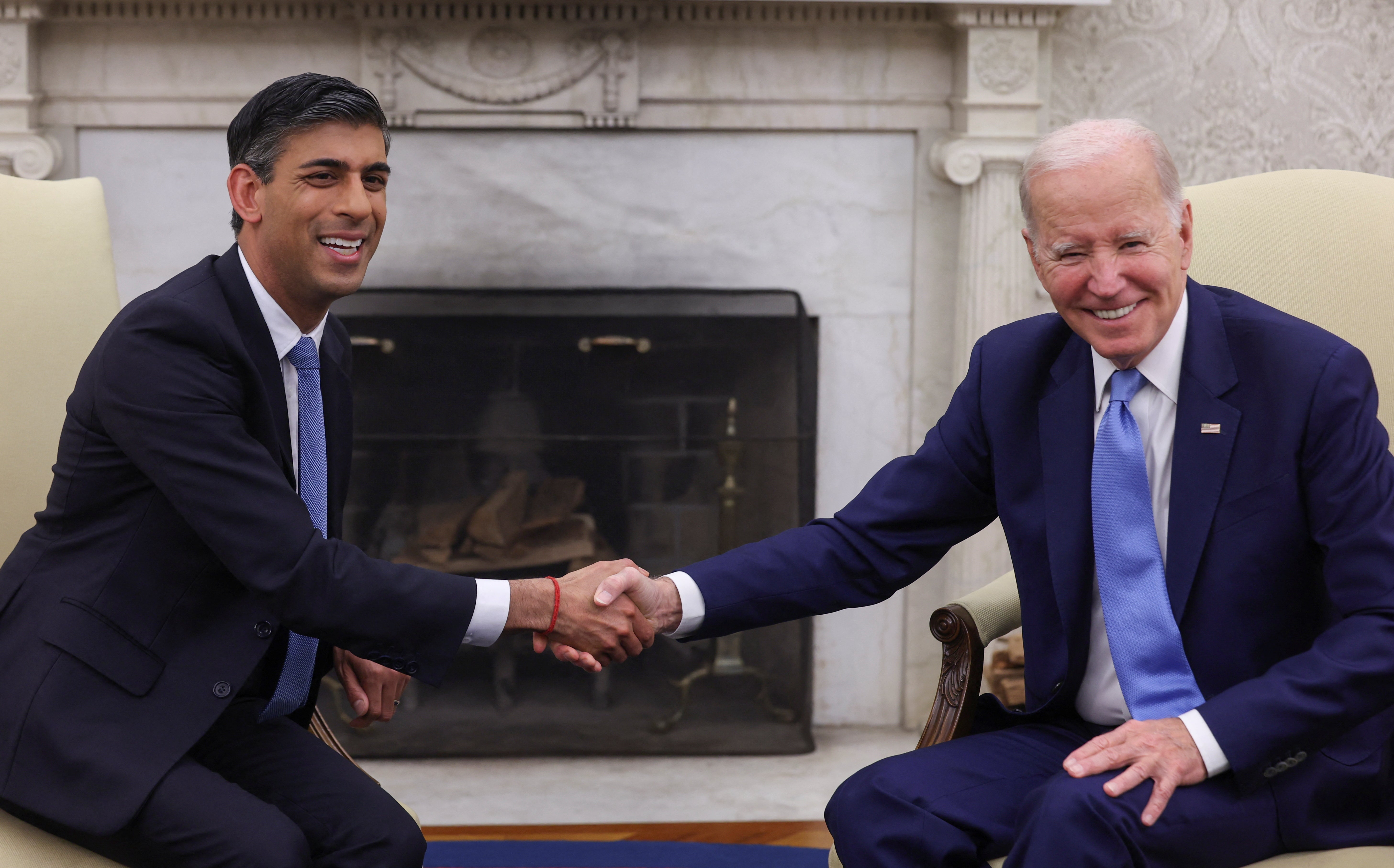Does Joe Biden really care what Rishi Sunak thinks about anything?
The US-UK relationship seems to be more one-sided than ever, writes John Rentoul


Apart from the occasional personal chemistry between presidents and prime ministers – Ronald Reagan and Margaret Thatcher; Bill Clinton and Tony Blair – the relationship between the US and the UK has long been lopsided.
Any British visitor to the US is surprised by the dearth of news coverage of the UK, in sharp contrast to our fixation on US politics and US culture wars as if they were our own. Nevertheless, Britain has long been significant in US foreign policy, mainly because US governments have seen us as a strong ally inside the EU, able to influence it in a favourable direction.
Now that we are out of the EU, we are inevitably less important in the world as seen from the White House.
Does ‘Irish’ Joe hate Britain?
No. In his long, long history as a member of the Senate foreign relations committee, Biden tended to be a supporter of the UK. He was a powerful advocate of the British cause in the Falklands war when the Reagan administration equivocated. Senator Biden argued that the US should be on the side of those resisting aggression, a position he advanced later in the Balkans, which meant that he was on the same side as Tony Blair in persuading Bill Clinton to threaten credible action against Slobodan Milosevic, the Serbian leader.
It is true that on his recent visit to Ireland, he spent more time in the Republic and seemed to be more engaged there than he was in Northern Ireland. That is partly because his Irish ancestors are from Ballina, County Mayo (although he also has a three-times-great grandfather from Westbourne in West Sussex). But it is partly because any US president seeking re-election has to court Irish Americans, who tend to take a simple view of Irish history in which the British feature as the colonial oppressor.
But there is a coolness towards Britain, isn’t there?
Biden wasn’t personally keen on Boris Johnson, one of the world’s most visible supporters of Donald Trump. But Biden is an experienced diplomat, and he purported to bond with Johnson over their shared love of railways during the year and a half that they overlapped as president and prime minister.
Biden, like most of the US foreign policy establishment, took a dim view of Brexit, which means that Sunak started off in the wrong place. That was another reason for Biden holding back over Northern Ireland – where the US blames Brexit for threatening the Good Friday Agreement. It was significant that the briefing from the US side before the Biden-Sunak meeting said that they would discuss Northern Ireland, a subject that the prime minister’s spokesperson had not mentioned in the British pre-briefing.
Again, though, Biden is a pragmatic and long-tested politician, and so he and Sunak have found it easy to do business where they have a common interest, such as the Aukus nuclear submarine pact between Australia, the UK and the US.
What happened to the US-UK trade deal?
One of the significant subjects that was not discussed by Biden and Sunak in the White House was the trade deal between the two countries that was supposed to be “easy” when Trump and Johnson talked about it. The UK has now gone back to the “back of the queue”, where Barack Obama said during the Brexit referendum campaign we would find ourselves.
The idea that leaving the EU would liberate the UK to sign a trade deal with the US was always moonshine, though. Trump couldn’t have got it through Congress even if he had been serious about it, which he wasn’t. For Biden, who at least understands how to manage US legislators, it simply isn’t a priority.
On the other hand, Brexit has freed the UK government to be a little more agile in securing minor agreements. The US is unlikely to show more than polite interest in Sunak’s offer to host an international agency to monitor the risks of artificial intelligence, but at least the UK can propose it, and once in a while such an initiative might actually succeed, possibly as a compromise between US and EU interests.
Subscribe to Independent Premium to bookmark this article
Want to bookmark your favourite articles and stories to read or reference later? Start your Independent Premium subscription today.






Join our commenting forum
Join thought-provoking conversations, follow other Independent readers and see their replies
Comments